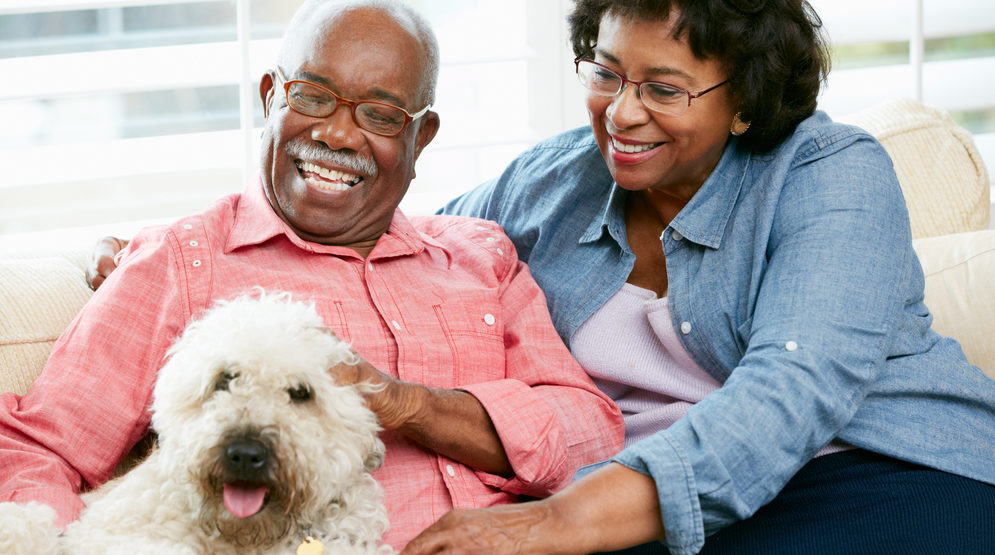New Mexico resident Theresa Kline is active and independent at age 81. But after her beloved Westie, Abby, passed away last year, she wondered if she should get another dog. Would having a dog tie her down? And what would happen to her pet if she became ill?
Still, Kline missed canine companionship and voiced her conundrum to her daughters, who promised to make arrangements if she could no longer care for the animal. So this March, she adopted Sage, a quiet 6-year-old Shih Tzu. She’s glad she adopted the sweet dog.
“What he loves best is walking,” she says. “By seven o’clock in the morning we’ve done a 20-minute walk.”
Social Connection
Pets like Sage can play an important role in the lives of seniors. In fact, research shows pets are important for healthy aging, according to Steven Feldman, director of the nonprofit Human Animal Bond Research Institute (HABRI).
“One of the real benefits is social connectedness. We know that social isolation and loneliness are growing challenges for older individuals in society,” he says. “Pets help not just by directly providing companionship, but also by connecting us with other people. When pets facilitate the connection to other people, we make more friends and these friends form a stronger social support network, which is important as we age.”
Have a Plan
Unfortunately, problems arise when a senior must give up a pet to move into an assisted living facility that doesn’t allow animals, or if caring for a pet on a fixed income becomes a financial burden. These are common reasons why cats and dogs wind up in shelters.
Lisa Lunghofer, Ph.D., and executive director of The Grey Muzzle Organization, a nonprofit that funds programs that help older dogs, said an increasing number of grantees are working to help seniors keep their pets by providing low-cost medical care and preventive services.
“It’s absolutely ideal for the pet and their person to remain together,” she says.
It’s also crucially important for all of us – no matter our age – to have a plan for caring for pets should we be unable to do so, she says. The Grey Muzzle Organization worked with attorney Debra Vey Voda-Hamilton to encourage pet lovers to develop a “MAAP”:
- Make a plan outlining the care you would like to have your pets receive.
- Address each of your pets and their unique needs.
- Appoint at least three caregivers; only one can be a family member.
- Publish your plans and keep them readily available.
“Planning ahead is the most effective strategy to ensure your beloved companion doesn’t end up in a shelter,” Dr. Lunghofer says. “In addition to appointing caregivers, you might also consider a pet trust from which the trustee disburses funds or property to the caregiver who will then use them to care for the pet in the manner you’ve laid out in the trust.”
If you or a senior you know are facing financial challenges in caring for a pet, look into local resources that can help. For instance, Knox PAWS in Knoxville, Tennessee, provides senior citizens with assistance getting to veterinary appointments and buying pet food. Lionel’s Legacy Senior Dog Rescue in San Diego, California, offers grants to people over 60 to help cover emergency medical care, annual exams, food, and supplies for pets.
Caregivers should also research pet-friendly assisted living facilities in case of future need. If that’s not an option, try to find a facility visited by therapy animals, as that can ease the transition and help seniors cope with having to rehome a pet.
In the meantime, Dr. Lunghofer encourages seniors (and younger folks, for that matter) to consider adopting a senior pet. Older animals are typically housetrained and require less exercise than puppies and kittens. Often, animal shelters and rescue organizations will waive or discount the adoption fee for people over 62. Plus, it’s a meaningful thing to do.
“Opening your heart and home to a senior dog is a deeply rewarding experience. Older dogs who have lost their families are especially grateful for a second chance to love and be loved again,” she says. “And people who have adopted senior dogs tell us they would do it again in a heartbeat. Senior humans, in particular, talk about how important their senior dogs are to them. Many say their dogs give them a reason to get up in the morning and are their best friends.”
This article was reviewed/edited by board-certified veterinary behaviorist Dr. Kenneth Martin and/or veterinary technician specialist in behavior Debbie Martin, LVT.
Award-winning journalist Jen Reeder is former president of the Dog Writers Association of America.








